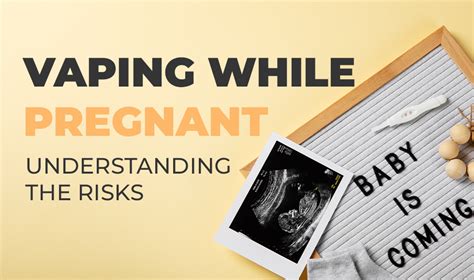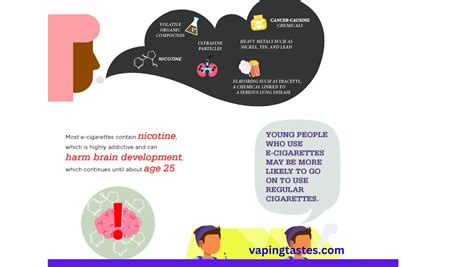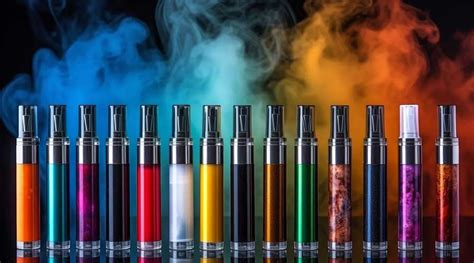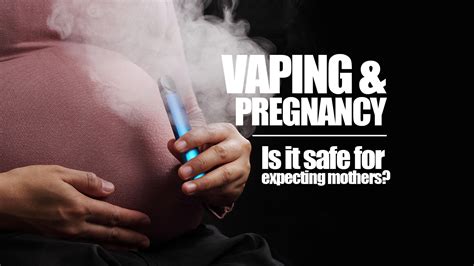Intro
Discover the dangers of vaping during pregnancy, including nicotine risks, e-liquid toxicity, and fetal health complications, to make informed choices for a healthy pregnancy and baby.
Pregnancy is a critical period in a woman's life, and it's essential to prioritize health and well-being to ensure the best possible outcome for both mother and baby. One aspect of health that has gained significant attention in recent years is the risks associated with vaping during pregnancy. As the use of e-cigarettes and other vaping products has become increasingly popular, concerns about their safety, particularly for pregnant women, have grown. In this article, we will delve into the world of vaping during pregnancy, exploring the risks, benefits, and what you need to know to make informed decisions.
The rise of vaping has led to a significant shift in the way people consume nicotine and other substances. E-cigarettes, which were initially marketed as a safer alternative to traditional tobacco products, have become a popular choice among smokers and non-smokers alike. However, as the vaping industry has evolved, so have the concerns about its impact on health, particularly for vulnerable populations like pregnant women. The risks associated with vaping during pregnancy are multifaceted and far-reaching, affecting not only the mother but also the developing fetus.
Vaping during pregnancy is a complex issue, and there is still much to be learned about its effects on maternal and fetal health. However, research has shed some light on the potential risks, which range from respiratory problems to birth defects. The chemicals present in e-liquids, including nicotine, heavy metals, and ultrafine particles, can have devastating consequences for the developing fetus. Moreover, the lack of regulation in the vaping industry has led to a proliferation of untested and unproven products, making it difficult for pregnant women to make informed decisions about their health.
Vaping and Pregnancy: Understanding the Risks

Vaping during pregnancy poses significant risks to both the mother and the developing fetus. Nicotine, a key ingredient in most e-liquids, is a highly addictive substance that can have severe consequences for fetal development. Research has shown that nicotine exposure during pregnancy can lead to a range of problems, including low birth weight, premature birth, and birth defects. Furthermore, the chemicals present in e-liquids can cause respiratory problems, such as asthma and chronic obstructive pulmonary disease (COPD), which can have long-term consequences for the mother's health.
Nicotine and Fetal Development
The impact of nicotine on fetal development is a critical concern for pregnant women who vape. Nicotine can cross the placenta, exposing the developing fetus to its toxic effects. Research has shown that nicotine exposure during pregnancy can lead to changes in fetal brain development, including alterations in the structure and function of the brain. These changes can have long-term consequences for the child's cognitive and behavioral development, including increased risk of attention deficit hyperactivity disorder (ADHD) and other neurodevelopmental disorders.The Benefits of Quitting Vaping During Pregnancy

While the risks associated with vaping during pregnancy are significant, the benefits of quitting are numerous. Quitting vaping can have a profound impact on both maternal and fetal health, reducing the risk of respiratory problems, birth defects, and other complications. Moreover, quitting vaping can also reduce the risk of nicotine addiction, which can have long-term consequences for the mother's health. Pregnant women who quit vaping can also reduce their risk of developing smoking-related illnesses, such as heart disease and lung cancer.
Strategies for Quitting Vaping During Pregnancy
Quitting vaping during pregnancy can be challenging, but there are several strategies that can help. Nicotine replacement therapy (NRT), such as gum, lozenges, and patches, can be effective in reducing nicotine cravings and withdrawal symptoms. Counseling and support groups can also provide valuable guidance and encouragement, helping pregnant women to stay on track and overcome the challenges of quitting. Additionally, pregnant women can also try alternative methods, such as acupuncture and hypnosis, which can help to reduce nicotine cravings and promote relaxation.Vaping and Breastfeeding: What You Need to Know

Vaping during breastfeeding is another critical concern, as the chemicals present in e-liquids can be passed to the baby through breast milk. Nicotine, in particular, can have significant consequences for infant development, including changes in sleep patterns, feeding habits, and cognitive development. Moreover, the chemicals present in e-liquids can also contaminate breast milk, exposing the baby to toxic substances that can have long-term consequences for their health.
The Risks of Vaping During Breastfeeding
The risks associated with vaping during breastfeeding are significant, and pregnant women should be aware of the potential consequences. Nicotine exposure during breastfeeding can lead to changes in infant behavior, including increased fussiness, irritability, and sleep disturbances. Moreover, the chemicals present in e-liquids can also cause respiratory problems, such as asthma and COPD, which can have long-term consequences for the infant's health. Pregnant women who vape during breastfeeding should be aware of these risks and take steps to minimize their exposure to nicotine and other toxic substances.Regulation of Vaping Products: A Critical Need

The regulation of vaping products is a critical need, particularly in light of the risks associated with vaping during pregnancy. The lack of regulation in the vaping industry has led to a proliferation of untested and unproven products, making it difficult for pregnant women to make informed decisions about their health. Regulatory agencies, such as the FDA, should take steps to ensure that vaping products are safe and effective, including implementing strict guidelines for the manufacture and sale of e-liquids.
The Role of Regulatory Agencies
Regulatory agencies play a critical role in ensuring the safety and efficacy of vaping products. The FDA, in particular, should take steps to regulate the vaping industry, including implementing strict guidelines for the manufacture and sale of e-liquids. This can include requiring manufacturers to disclose the ingredients used in their products, as well as conducting rigorous testing to ensure that products are safe and effective. Moreover, regulatory agencies can also provide guidance and education to pregnant women, helping them to make informed decisions about their health.Conclusion and Next Steps

In conclusion, vaping during pregnancy poses significant risks to both the mother and the developing fetus. The chemicals present in e-liquids, including nicotine, heavy metals, and ultrafine particles, can have devastating consequences for fetal development and maternal health. Pregnant women who vape should be aware of these risks and take steps to minimize their exposure to nicotine and other toxic substances. Regulatory agencies, such as the FDA, should also take steps to ensure that vaping products are safe and effective, including implementing strict guidelines for the manufacture and sale of e-liquids.
We invite you to share your thoughts and experiences with vaping during pregnancy in the comments below. Your input can help to raise awareness about the risks associated with vaping during pregnancy and promote a healthier and safer community for all.
What are the risks associated with vaping during pregnancy?
+The risks associated with vaping during pregnancy include low birth weight, premature birth, and birth defects. Nicotine exposure during pregnancy can also lead to changes in fetal brain development, including alterations in the structure and function of the brain.
Can I quit vaping during pregnancy?
+Yes, quitting vaping during pregnancy is possible and highly recommended. Nicotine replacement therapy (NRT), counseling, and support groups can help pregnant women to quit vaping and reduce their risk of nicotine addiction.
Is it safe to vape during breastfeeding?
+No, it is not safe to vape during breastfeeding. The chemicals present in e-liquids can be passed to the baby through breast milk, exposing them to toxic substances that can have long-term consequences for their health.
